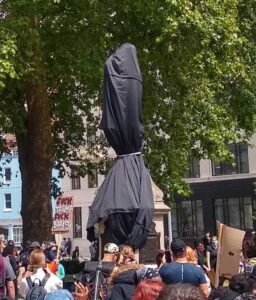
Calls for ‘an international memorial to the victims of enslavement’[1] sound reasonable, but my own experience this year uncovered a strong tendency to keep slavery history hidden.
I was ambivalent last year when Colston was toppled. Of course, black lives matter, but so does history. I was apprehensive about other groups damaging historical objects. The protest, however, set me thinking, recognising my limited understanding, and eventually investigating slavery issues.
Last year, I began to write some ‘traditional’ history, about the Forest of Dean coal mine where my grandfather had worked. I did not reject Black History; it just seemed irrelevant. All my Lydney Grammar School classmates in the 1970s were white; and years of reading suggested Forest history was simply ‘white’.
Earlier this year, however, I stumbled upon some links between Edward Protheroe (1774-1856), ‘the father of the Forest coalfield’, and slavery. The Colston episode encouraged me to look deeper. Each discovery prompted further research. I discovered the Bristol-based Protheroe dynasty were deeply involved with slavery.
Piece by piece, I also found many links between the slavery wealth of the Protheroes (and their associates) and spending – on country houses, schools, coal mines, church appointments, and much more, from theological libraries to essays on agricultural improvement.
I shared my discoveries enthusiastically with today’s occupants (headteachers, National Trust agents, vicars, etc). I discovered a common, almost universal response: a clear pattern of deliberately maintaining the silence. The individuals themselves, if they replied, were pleasant, not at all conscious advocates of racism. They perhaps wanted to avoid unpleasant facts; to maintain good relations with the family in the National Trust property; to foster a favourable image for their fee-paying school; to avoid angry crowds descending on some over-worked vicar; or they feared potential vandalism.
Whatever the motivations, the cumulative effect of deliberate choices was to hide actual links with slavery. They were not responsible for the past, but they opted to play a part in obscuring this history.
One Anglican said Bristol churches were auditing their links with slavery. If genuine outcomes result, this will be a welcome bucking of the general trend.
In the last century, history-telling moved on from narrow focus on kings and great barons, towards inclusion, for example, of ordinary working people’s lives or women’s experience.
What I had not recognised, until repeated experience made it obvious, is that slavery history is systematically obscured (as Madge Dresser has already demonstrated). Not by an agreed collective conspiracy, but by many small-scale individual decisions to step lightly, to be sensitive to (white) people’s feelings (but at the expense of other people!)
In one disappointing example, I had sought a small addition to the information board, perhaps, that this preaching vicar in this particular painting, surrounded by an enraptured family, the epitome of holiness, actually had his position purchased with money derived from slavery. I did not want the painting removed nor damaged, but such a caption might tell a fuller story, more inclusive, for everyone, and nearer to the complicated truth.
As an avid follower of ‘Who Do You Think You Are?’, I recognise how history can matter to people. My own experience is admittedly anecdotal, but I have witnessed a predictably consistent pattern repeated many times. I can only conclude that links with slavery are systematic downplayed and obscured. The most common reaction I experienced was deliberate, conscious avoidance of such new information. One vicar, for example, emailed me a ‘God bless’, but wanted to know nothing more about the links between his parish church and slavery. Apart from the blessing, this was an entirely typical response.
Our responsibility for what others did in the past is strongly debated. Wealth from slavery empowered Edward Protheroe to exploit my own ancestors’ Forest of Dean community and other people further afield in Wales; but British people gained many benefits from slavery.
Undoubtedly, however, we are fully responsible for our choices today: this includes any ways we collude in obscuring the past and denying people today appropriate access to their own story.
Before my investigations, I had thought history involved arguments about interpreting the facts, but this experience showed me people are willing to deliberately supress the facts.
Now, I finally understand that entrenched barriers and deliberate, conscious resistance exists to telling the truth about slavery history. In the end, I appreciate why, after protracted but fruitless negotiations, Colston had to fall.
[1] https://www.brh.org.uk/site/2020/10/benign-force-the-society-of-merchant-venturers/